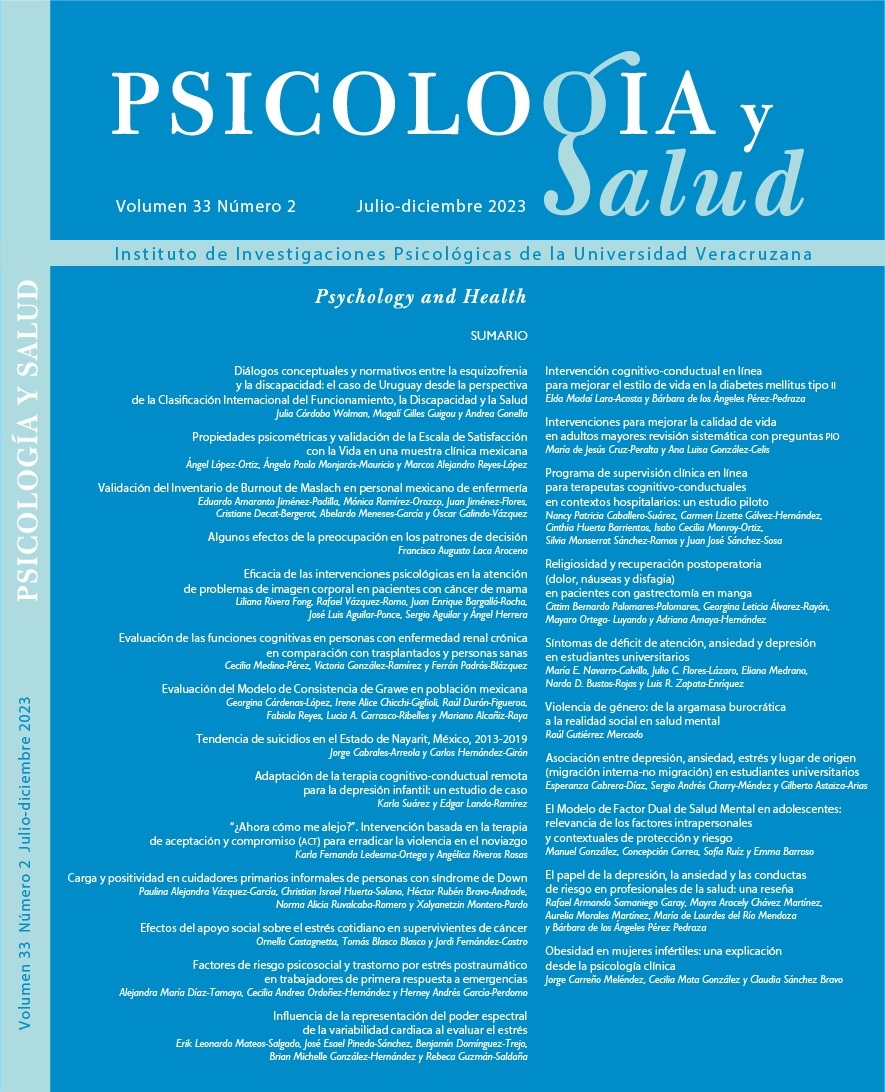Abstract
Cancer survivors must adapt in many cases to sequelae and limitations that produce emotional distress and stress daily. Social support can help reduce this discomfort, but the effects of how often it is received still need to be determined or whether its absence produces adverse effects. The present study evaluated the daily discomfort of 60 cancer survivors, using daily recordings, the stress experienced, and the social support received. The results indicate that receiving social support reduces discomfort in the short term but seems less effective when the patient attributes the cause of discomfort to being a survivor. The reduction in discomfort, however, is not sustained in the long term. These results suggest that the survivor should receive help to cope with daily discomfort and their social environment to understand better its causes to provide more effective support.
References
Allemani, C., Matsuda, T., Di Carlo, V., Harewood, R., Matz, M., Nikšić, M., Bonaventure, A., Valkov, M., Johnson, C.J., Estève, J., Ogunbiyi, O.J., Azevedo, E., Silva, G., Chen, W.Q., Eser, S., Engholm, G., Stiller, C.A., Monnereau, A., Woods, R.R., Visser, O., Lim, G.H. y Concord Working Group (2018). Global surveillance of trends in cancer survival 2000-14 (Concord-3): Analysis of individual records for 37’513,025 patients diagnosed with one of 18 cancers from 322 population-based registries in 71 countries. Lancet, 391(10125), 1023-1075. Doi: 10.1016/S0140-6736(17)33326-3.
Almeida, D.M., Wethington, E. y Kessler, R.C. (2002). The Daily Inventory of Stressful Events: An interview-based approach for measuring daily stressors. Assessment, 9(1), 41-55.
Arrighi, E. (2014). Necesidades de personas que han finalizado los tratamientos oncológicos en España. Tesis doctoral inédita. Bellaterra (Barcelona): Universitat Autònoma de Barcelona.
Carpenter, K.M., Fowler, J.M., Maxwell, G.L. y Andersen, B.L. (2010). Direct and buffering effects of social support among gynecologic cancer survivors. Annals of Behavior Medicine, 39, 79-90. Doi: 10.1007/s12160-010-9160-1.
Castagnetta, O., Blasco, T. y Fernández C., J. (2021) Estrés cotidiano en supervivientes de cáncer. Psicooncología, 18(1), 37-50. Doi: 10.5209/psic.68238.
Chu, Q., Wong, C.C.Y. y Lu, Q. (2021) Social constraints and PTD.E. among Chinese American breast cancer survivors: not all kinds of social support provide relief. Journal of Behavioral Medicine, 44, 29-37. Doi: 10.1007/s10865-020-00165-y.
Cohee, A., Johns, S.A., Alwine, J.S., Talib, T., Monahan, P.O., Stump, T.E., Cella, D. y Champion, V.L. (2021) The mediating role of avoidant coping in the relationships between physical, psychological, and social wellbeing and distress in breast cáncer survivors. Psycho-Oncology, 30, 1129-1136. Doi: 10.1002/pon.5663.
García T., F. y Alós, F.J. (2015) Tratamientos psicológicos eficaces para reducir la fatiga en los supervivientes al cáncer: estado de la cuestión y perspectivas de futuro. Papeles del Psicólogo, 36(3), 182-188.
Grupo Español de Pacientes con Cáncer (GEPAC) (2013). Todo lo que empieza cuando termina el cáncer. Manual para supervivientes de cáncer y sus familiares. Madrid: GEPAC.
Huang, C.Y. y Hsu, M.C. (2013). Social support as a moderator between depressive symptoms and quality of life outcomes of breast cancer survivors. European Journal of Oncology Nursing, 17, 767-774. Doi: 10.1016/j.ejon.2013.03.011.
Hughes, S., Jaremka, L., Alfano, C., Glaser, R., Povoski, S., Lipari, A., Agnese, D., Farrar, W. et al. (2014). Social support predicts inflammation, pain, and depressive symptoms: Longitudinal relationships among breast cancer survivors. Psychoneuroendocrinology, 42, 38-44. Doi: 10.1016/j.psyneuen.2013.12.016.
Jang, M. y Kim, J. (2018). A structural model for stress, coping, and psychosocial adjustment: A multi-group analysis by stages of survivorship in Korean women with breast cancer. European Journal of Oncology Nursing, 33, 41-48. Doi: 10.1016/j.ejon.2018.01.004.
Kluthcovsky, A.C.G.G., Urbanetz, A.A., de Carvalho, D.S., Maluf, E.M.C.P., Sylvestre, G.C.S. y Hatschbach, S.B.B. (2012). Fatigue after treatment in breast cancer survivors: prevalence, determinants, and impact on health related quality of life. Supportive Care in Cancer, 20, 1901-1909. Doi: 10.1007/s00520-011-1293-7.
Linden, W. y Vodermaier, A. (2012). Mismatch of desired versus perceived social support and associated levels of anxiety and depression in newly diagnosed cancer patients. Supportive Care in Cancer, 20, 1449-1456. Doi: 10.1007/s00520-011-1228-3.
Martínez L., P. y Andreu V., Y. (2019) Supervivencia en cáncer: la necesidad de una atención integral y la importancia de asumir un rol activo. Papeles del Psicólogo, 40(1), 39-45. Doi: 10.23923/pap.psicol2019.2885.
McDonough, M.H., Beselt, L.J., Daun, J.T., Shank, J., Culos-Reed, S.N., Kronlund, L.J. y Bridel, W. (2019). The role of social support in physical activity for cancer survivors: A systematic review. Psycho-Oncology, 28, 1945-1958. Doi: 10.1002/pon.5171.
Navarro, E., Limonero, J.T., Maté, J. y Gómez R., M.J. (2010). Necesidades de comunicación e información en el paciente oncológico superviviente. Psicooncología, 7, 127-141.
Ochoa A., C. y Casellas G., A. (2017) El cambio vital positivo tras un cáncer: ingredientes, claves para facilitarlo y efectos sobre el bienestar. Papeles del Psicólogo, 38(1), 1-11. Doi: 10.23923/pap.psicol2017.2815.
Organización Mundial de la Salud (2020). Cáncer. Ginebra: OMS. Recuperado de https://www.who.int/es/news-room/fact-sheets/detail/cancer.
Ponce G., J.M., Velásquez S., A., Márquez C., E., López R., L. y Bellido M., M.L. (2009). Influencia del apoyo social en el control de las personas con diabetes. Index de Enfermería: Información, 18(4), 224-228.
Santiago S., D.Z. y Sánchez-Aragón, R. (2021). La empatía y el apoyo de la pareja como factores protectores del estrés en pacientes de cáncer. Psicología y Salud, Núm. Esp., 85-96. Doi: 10.25009/pys.v31i3.2730.
Shiffman, S., Stone, A.A. y Hufford, M.R. (2008). Ecological Momentary Assessment. Annual Review of Clinical Psychology, 4, 1-32. Doi: 10.1146/annurev.clinpsy.3.022806.091415.
Talley, A., Molix, L., Schlegel, R.J. y Bettencourt, A. (2010). The influence of breast cancer survivors’. Perceived partner social support and need satisfaction on depressive symptoms: A longitudinal analysis. Psychology and Health, 25(4), 433-449. Doi: 10.1080/08870440802582682.
Torres S., S.M. y Sánchez-Aragón, R. (2021) El papel de los eventos hirientes y la regulación emocional en la calidad de vida relacionada con la salud de pacientes con cáncer. Psicología y Salud, Núm. Esp., 97-110. Doi: 10.25009/pys.v31i3.2731.
Yeung Y., N. y Lu, Q. (2018). Perceived stress as a mediator between social support and posttraumatic growth among Chinese American breast cancer survivors. Cancer Nursing, 41(1), 53-61. Doi: 10.1097/NCC.0000000000000422.

